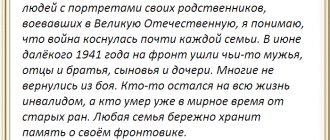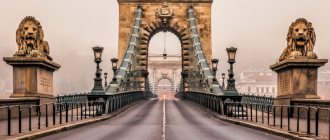- Essays
- About war
- Heroism in war
Heroism is a person’s ability to accomplish a feat. The ability to sacrifice oneself for the sake of others. Ability to overcome obstacles and solve problems.
Only a person who has perseverance and courage can become a hero.
The history of all peoples and states reflects the actions of people that can be called heroic. But not everyone goes down in history. Many remained unknown or forgotten. But still, there have always been and will be people who, no matter what, will go to victory, sometimes at the cost of their lives.
Heroism presupposes the ability to self-sacrifice for the good of the Motherland. Those who went through the Great Patriotic War became heroes of our country. They sacrificed everything: health, lives for the sake of our future.
They are no different from the others. Moreover, the majority can perform a heroic act. The main thing is the presence of qualities in a person: heroism, courage and perseverance.
Heroism is the readiness to commit any act at any time and never regret it. A true hero will not think about the consequences of an action. He will not think about awards and honors. Heroism must be embedded in the soul. A hero is not always a strong warrior, like Ilya Muromets. A true hero is strong in spirit. It happens that a seemingly ordinary-looking person is capable of heroic deeds. Remember, at least, the Great Patriotic War. How many children and women gave their lives for our future. They were partisans, nurses, some fought in battle along with men. They went to war at the call of their souls, because they were real heroes.
There is another kind of heroism, when a person, under no circumstances, forgets about honor, decency, friendship, and philanthropy. An example is the fate of those who worked and thereby helped the army, despite all the horrors of the blockade in Leningrad. Those who, under torture, did not surrender their friends, officers, even to the Gestapo. Those who, in Hitler's and Stalin's camps, retained dignity, courage, and goodwill. Who, despite everything, remained people.
Heroism can manifest itself not only in war or when a person is placed in certain conditions. Polar explorers, scientists (for example, Thor Heyerdahl), doctors (who infected themselves with deadly diseases in order to find a vaccine), astronauts. After all, the unexpected awaits them all.
Isn’t it heroic to pull people out of a burning house, to help a drowning person?
Heroism is the future of any country. And the task of society is to instill in the modern generation respect for those thanks to whom life on earth has become better.
Option 2
For every person, war represents the death of loved ones, destruction and fear of the unexpected. And therefore in such a situation we act differently. Some bravely go into battle and become heroes, while others cowardly surrender or flee from the battlefield.
What does it mean to be a hero? Let's try to figure it out by turning to the works of world classics. Thus, Tolstoy showed in “Sevastopol Stories” how officers, by their example, showed ordinary soldiers how to fight without panicking and defend every inch of their land. The image of the soldier Tushin in the novel “War and Peace” shows us how a simple warrior, having a small number of defenders like himself, helped a huge army. With heroes like Maresyev and Talalikhin, you don’t have to be afraid of enemy attacks.
The well-known Tvardovsky created the poem “Vasily Terkin,” where he depicted the ingenuity and courage of a Russian soldier who, at the cost of his life, swam across a cold river only to convey information about the number of the enemy. However, heroism was manifested not only during a battle or a responsible mission. We must not forget that women and children provided enormous assistance and support in the victory, selflessly working without sleep or rest on the machines of factories and factories, producing the products necessary for the front. How much courage and self-control must be endured in order to return to your workplace after receiving a funeral, continuing to work for your Fatherland and a bright future.
Let us remember the residents of besieged Leningrad, who, despite the hellish conditions created, did not lose heart, and were able not only to remain in their hometown, but also to preserve valuable historical and cultural monuments. Reading the lines of Olga Berggolts, you understand how clearly the author showed such a strong height of the human spirit. We all understand that thanks to the courage and heroism of our people, there is now a peaceful and calm situation in the country. And I think that if there is a danger to the Motherland, then each of us will go to defend our native land, performing heroic deeds.
Essay on the theme of heroism in war
The motto of the guardsmen - to always be heroes - was vividly embodied in the immortal feat of the Panfilovites, which was accomplished by 28 soldiers of the 316th division of General I.V. Panfilov. Defending the line at the Dubosekovo crossing, this group under the command of political instructor V.G. Klochkov on November 16 entered into single combat with 50 German tanks, accompanied by a large detachment of enemy machine gunners. Soviet soldiers fought with unparalleled courage and tenacity. “Russia is great, but there is nowhere to retreat. Moscow is behind us,” the political instructor addressed the soldiers with such an appeal. And the soldiers fought to the death, 24 of them, including V.G. Klochkov, died the death of the brave, but the enemy did not pass here. The example of Panfilov’s men was followed by many other units and units, crews of airplanes, tanks and ships. The legendary feat of the airborne detachment under the command of Senior Lieutenant K.F. Olshansky appears before us in all its grandeur. A detachment of 55 sailors and 12 Red Army soldiers in March 1944 made a daring raid on the German garrison in the city of Nikolaev. Eighteen fierce attacks were repelled by Soviet soldiers within 24 hours, destroying four hundred Nazis and knocking out several tanks. But the paratroopers also suffered huge losses, their strength was running out. By this time, Soviet troops, advancing on Nikolaev bypassing, achieved decisive success. The city was free. All 67 landing participants, 55 of them posthumously, were awarded the title of Hero of the Soviet Union. During the war years, 11,525 people were awarded this high title. “Win or die” was the only question in the war against German fascism, and our soldiers understood this. They consciously gave their lives for their Motherland when the situation demanded it. The legendary intelligence officer N.I. Kuznetsov, going behind enemy lines on a mission, wrote: “I love life, I’m still very young. But because the Fatherland, which I love like my own mother, requires me to sacrifice my life in the name of liberating it from the German occupiers, I will do it. Let the whole world know what a Russian patriot and Bolshevik is capable of. Let the fascist leaders remember that it is impossible to conquer our people, just as it is impossible to extinguish the Sun.” A striking example that personifies the heroic spirit of our soldiers is the feat of the Komsomol Marine Corps fighter M.A. Panikakhin. During an enemy attack on the approaches to the Volga, he, engulfed in flames, rushed to meet a fascist tank and set it on fire with a bottle of fuel. The hero burned down along with the enemy tank. His comrades compared his feat with the feat of Gorky’s Danko: the light of the Soviet hero’s feat became a beacon to which other heroic warriors looked up. What strength of spirit was demonstrated by those who did not hesitate to cover with their bodies the embrasure of the enemy bunker that was spewing deadly fire! Private Alexander Matrosov was one of the first to accomplish such a feat. The feat of this Russian soldier was repeated by dozens of fighters of other nationalities. Among them are the Uzbek T. Erdzhigitov, the Estonian I.I. Laar, the Ukrainian A.E. Shevchenko, the Kyrgyz Ch. Tuleberdiev, the Moldovan I.S. Soltys, the Kazakh S.B. Baitagatbetov and many others. Following the Belarusian Nikolai Gastello, Russian pilots L.I. Ivanov, N.N. Skovorodin, E.V. Mikhailov, Ukrainian N.T. Vdovenko, Kazakh N. Abdirov, Jew I.Ya. Irzhak and other. Of course, selflessness and contempt for death in the fight against the enemy do not necessarily entail the loss of life. Moreover, often these qualities of Soviet soldiers help them mobilize all their spiritual and physical strength to find a way out of a difficult situation. Faith in the people, confidence in victory, in the name of which the Russian man goes to death without fear of it, inspires the fighter, pours new strength into him. Thanks to these same reasons, thanks to iron discipline and military skill, millions of Soviet people, who looked death in the face, won and remained alive. Among these heroes are 33 Soviet heroes, who in August 1942, on the outskirts of the Volga, defeated 70 enemy tanks and a battalion of their infantry. It is almost incredible, but, nevertheless, a fact that this small group of Soviet soldiers, led by junior political instructor A.G. Evtifev and deputy political instructor L.I. Kovalev, having only grenades, machine guns, petrol bottles and one anti-tank rifle , destroyed 27 German tanks and about 150 Nazis, and she herself emerged from this unequal battle without losses. During the war years, such qualities of our soldiers and officers as perseverance and inflexibility of will in the performance of military duty, which constitute an important element of true heroism, were very clearly manifested. Even in the most difficult conditions of the initial period of the war, the bulk of our soldiers did not become despondent, did not lose their presence of mind, and retained firm confidence in victory. Courageously overcoming “fear of tanks and planes,” inexperienced soldiers became seasoned fighters. The whole world knows the iron steadfastness of our soldiers in the days of the heroic defense of Leningrad, Sevastopol, Kyiv, and Odessa. The determination to fight the enemy to the end was a mass phenomenon and was expressed in the oaths of individual soldiers and units. Here is one of these oaths taken by Soviet sailors during the defense of Sevastopol: “For us the slogan is “Not a step back!” became the slogan of life. We are all, as one, unshakable. If there is a lurking coward or a traitor among us, then our hand will not waver - he will be destroyed.” The actions of Soviet soldiers in the historical battle on the Volga were marked by great tenacity and courage. There was essentially no leading edge - it was everywhere. There was a fierce bloody struggle for every meter of land, for every house. But even in these incredibly difficult conditions, the Soviet soldiers survived. They survived and won, first of all, because a united military team was formed here, there was an idea. It was the common idea that was the cementing force that united the warriors and made their resilience truly ironclad. The words “Not a step back!” for all soldiers and officers they became a requirement, an order, the meaning of existence. The defenders of the military stronghold were supported by the whole country. 140 days and nights of continuous battles for the city on the Volga is a true epic of folk heroism. The legendary resilience of the city on the Volga is personified by its famous heroes, among them Sergeant I.F. Pavlov, who led a handful of brave men who penetrated one of the houses. This house, turned into an impregnable fortress, entered the annals of the war as Pavlov's House. The memory of the feat of signalman V.P. Titaev, who, dying, clamped the broken ends of the wire with his teeth and restored the broken connection, will never fade. Even when he was dead, he continued to fight the Nazis. Kursk Bulge - here the Nazi command wanted to take revenge and change the course of the war in their favor. However, the heroism of the Soviet people knew no bounds. It seemed that our soldiers had turned into fearless heroes and no force could keep them from carrying out the orders of the Motherland. The 3rd Fighter Brigade alone repelled 20 attacks and destroyed 146 enemy tanks in four days of fighting. Captain G.I. Igishev’s battery heroically defended its combat positions near the village of Samodurovka, towards which up to 60 fascist tanks rushed. Having destroyed 19 tanks and 2 infantry battalions, almost all the batteries died, but did not let the enemy through. The village where the battle took place is named after Hero of the Soviet Union Igishev. Guard pilot Lieutenant A.K. Gorovets on a fighter plane, the fuselage of which was decorated with the inscription “From collective farmers and collective farmers of the Gorky Region,” alone entered into battle with a large group of enemy bombers and shot down 9 of them. He was posthumously awarded the title of Hero of the Soviet Union. In the battles near Orel, pilot A.P. Maresyev showed an example of valor and courage, returning to duty after being seriously wounded and amputated on both legs and shooting down 3 enemy aircraft. The enemy was stopped along the entire front and Soviet troops launched a counteroffensive. On this day, near the village of Prokhorovka, the largest oncoming tank battle in history took place, in which about 1,200 tanks took part on both sides. The main role in launching a counterattack against the advancing enemy belonged to the 5th Guards Tank Army under the command of General P.A. Rotmistrov. Having liberated Ukraine and Donbass, Soviet troops reached the Dnieper and immediately began crossing the river simultaneously in many areas. Advance units using available means - fishing boats, rafts, planks, empty barrels, etc. - overcame this powerful water barrier and created the necessary bridgeheads. It was an outstanding feat. About 2,500 soldiers and officers were awarded the title of Hero of the Soviet Union for the successful crossing of the Dnieper. Access to the lower reaches of the Dnieper allowed our troops to block the enemy in Crimea. A striking example of courage and extraordinary bravery is the combat activities of the intelligence officer Hero of the Soviet Union V.A. Molodtsov and his comrades I.N. Petrenko, Yasha Gordienko and others. Having settled on the instructions of the state security authorities in the catacombs of Odessa, occupied by the enemy, and experiencing the greatest difficulties (there was not enough food, the Nazis poisoned them with gas, walled up the entrances to the catacombs, poisoned the water in the wells, etc.), Molodtsov’s reconnaissance group for seven months regularly transmitted valuable intelligence information about the enemy to Moscow. They remained loyal to their homeland to the end. When asked to submit a petition for clemency, Molodtsov stated on behalf of his comrades: “We do not ask for clemency from our enemies on our land.” Military skill greatly enhanced the resilience and other moral and combat qualities of our soldiers. That is why our soldiers put their whole soul into mastering weapons, equipment, and new fighting techniques. It is known how widespread the sniper movement became at the front. There were so many famous names here that received well-deserved fame! One of the most characteristic features of the spiritual appearance of our soldiers is a sense of collectivism and camaraderie.
Reasoning
Heroic people are capable of accomplishing great feats. They constantly sacrifice themselves for the well-being of others. They constantly overcome obstacles and solve many problems. Only persistent and brave people can bear the title of hero.
The history of every state and people reflects the exploits of heroic people. But not everyone can boast of their place of history. Many were forgotten without being recognized. Despite this, a heroic person will always strive to win even when life and limb are threatened.
Heroes are capable of self-sacrifice for the good of the Motherland. People who passed through the Great Patriotic War rightfully bear the title of heroes of our country. Many put their health and lives on the line for the future well-being of their native state.
Outwardly, these are ordinary people, inconspicuous. The heroic, courageous and persistent attitude of the most ordinary person may be invisible to the naked eye. And he will be able to accomplish a real feat.
The hero is ready to commit an act at any time, without thinking, and without regretting anything. The consequences of an action are the last thing a hero will think about. Awards and honors are also not of interest to such people. Heroism has its beginning, and it is in the human soul, in the strength of the spirit. History paints us heroes who are strong in body and soul. This can be seen from the descriptions of Ilya Muromets, Alyosha Popovich, and Dobrynya Nikitich. These are strong-willed big men who knew no fear and never gave in to difficulties. But not only people with a similar physique can be able to accomplish the feat. Sometimes ordinary people can commit such a heroic act that those around them simply did not expect. During the Great Patriotic War, not only men performed feats. It happened that women, old people and even children became heroes. They tried to help the soldiers on the front line as best they could. Women were nurses, teenagers were partisans. The call of the soul forced them to contribute to the successful outcome of military operations.
There were other heroes in the war. They were called the labor front. They worked to provide the rear. Even in besieged Leningrad they did not stop working to survive. Those who were captured were subjected to inhuman torture. And only true heroes did not betray their comrades.
Heroes are the future of every state. The task of the public is to instill in the modern generation respect for people who fought for a better life.




